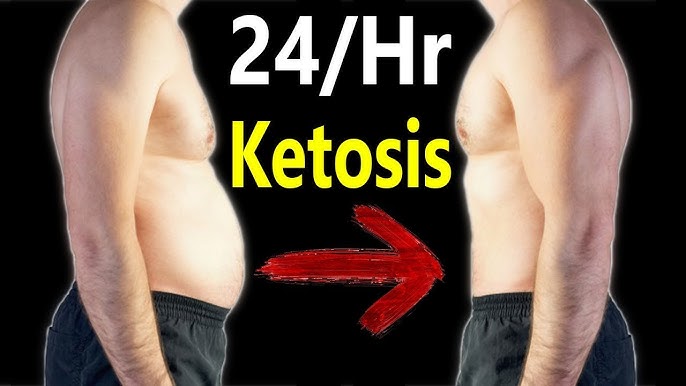Does a 24-Hour Fast Help Ketosis?
In recent years, fasting and ketogenic diets have gained immense popularity for their potential health benefits. One common question is whether a 24-hour fast can help achieve ketosis. To answer this, we need to understand both ketosis and fasting, and how they interact.
Table of Contents
What is Ketosis?
Ketosis is a metabolic state where the body burns fat for fuel instead of carbohydrates. This process occurs when there is a significant reduction in carbohydrate intake, causing the liver to produce ketones from fat. Ketosis has been associated with numerous benefits, including weight loss, improved mental clarity, and stabilized blood sugar levels.
Understanding Fasting
Fasting involves voluntarily abstaining from food for a specific period. There are various types of fasting, such as intermittent fasting, alternate-day fasting, and extended fasting. Each type has its unique benefits, including improved metabolic health, enhanced fat burning, and increased longevity.
How a 24-Hour Fast Works
A 24-hour fast typically involves eating dinner and then not consuming any more calories until dinner the following day. During this period, the body depletes its glycogen stores and begins to burn fat for energy. This shift can help induce ketosis more quickly than a ketogenic diet alone.
Fasting and Ketosis: The Connection
Fasting naturally lowers insulin levels and increases the production of ketones, which are essential for entering ketosis. Typically, it takes about 2-4 days of fasting or significant carbohydrate restriction to enter ketosis, but a 24-hour fast can accelerate this process.
Benefits of a 24-Hour Fast for Ketosis
- Enhanced Fat Burning: With depleted glycogen stores, the body turns to fat for fuel, promoting weight loss.
- Improved Mental Clarity: Ketones are an efficient fuel for the brain, often resulting in clearer thinking and better focus.
- Stabilized Blood Sugar Levels: Fasting can help regulate insulin sensitivity, reducing the risk of diabetes.
Potential Drawbacks
While a 24-hour fast can be beneficial, it’s not suitable for everyone. Potential side effects include dizziness, headaches, and irritability. Individuals with certain health conditions, such as diabetes or eating disorders, should avoid prolonged fasting.
Scientific Studies on Fasting and Ketosis
Research supports the connection between fasting and ketosis. Studies show that fasting can significantly increase ketone production, enhancing the benefits of a ketogenic diet. However, individual responses can vary, and more research is needed to fully understand the long-term effects.
Practical Tips for a Successful 24-Hour Fast
- Preparation: Gradually reduce your food intake before the fast and stay hydrated.
- During the Fast: Drink plenty of water, herbal teas, and electrolyte-rich beverages.
- Post-Fast: Break your fast with a balanced meal rich in healthy fats, protein, and minimal carbohydrates.
Combining Fasting with a Ketogenic Diet
Pairing a 24-hour fast with a ketogenic diet can have synergistic effects, amplifying the benefits of both. For instance, the ketogenic diet keeps you in a state of ketosis, while fasting can help deepen that state more rapidly.
Real-Life Experiences
Many people who practice 24-hour fasting report increased energy levels, weight loss, and improved mental clarity. However, they also face challenges such as hunger and social constraints, which can be managed with proper planning and support.
Who Should Try a 24-Hour Fast?
A 24-hour fast is ideal for individuals who are already following a low-carb or ketogenic diet and are looking to accelerate their results. However, it’s essential to consult with a healthcare provider before starting any fasting regimen, especially if you have underlying health conditions.
FAQs about 24-Hour Fasting and Ketosis
- Can I drink coffee during a 24-hour fast?
- Yes, black coffee is typically allowed and can even help suppress appetite.
- Will a 24-hour fast cause muscle loss?
- Short-term fasting is unlikely to cause significant muscle loss, especially if you are consuming adequate protein when you eat.
- How often should I do a 24-hour fast?
- This depends on individual goals and health status, but many people find benefit in fasting once or twice a week.
- What if I feel weak or dizzy during the fast?
- If you experience severe symptoms, it’s important to break the fast and seek medical advice.
- Is a 24-hour fast safe for everyone?
- No, individuals with certain medical conditions or those who are pregnant or breastfeeding should avoid prolonged fasting without medical supervision.
Conclusion
A 24-hour fast can be an effective tool for achieving and maintaining ketosis, offering benefits like enhanced fat burning and improved mental clarity. However, it’s not suitable for everyone and should be approached with care. Always consult with a healthcare professional before making significant changes to your diet or fasting routine.

5 Unique FAQs
- Can a 24-hour fast improve my sleep quality?
- Some people report better sleep after fasting, but this can vary based on individual responses.
- Is it okay to exercise during a 24-hour fast?
- Light to moderate exercise is generally fine, but intense workouts may be challenging without food.
- How do I handle social situations during a 24-hour fast?
- Planning and communicating your fasting schedule can help manage social events without feeling pressured to eat.
- Will fasting affect my metabolism?
- Short-term fasting is unlikely to negatively impact your metabolism and may even improve metabolic health.
- Can I take supplements during a 24-hour fast?
- Yes, but choose supplements that do not contain calories or sugar.


